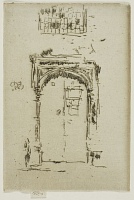Church Doorway, Edgware | ||
| Number: | 291 | |
| Date: | 1887/1888 | |
| Medium: | etching | |
| Size: | 99 x 67 mm | |
| Signed: | butterfly at left | |
| Inscribed: | no | |
| Set/Publication: | no | |
| No. of States: | 1 | |
| Known impressions: | 3 | |
| Catalogues: | K.303; M.298 | |
| Impressions taken from this plate (3) | ||
PUBLICATION
Church Doorway, Edgware was never published.
EXHIBITIONS
It was first exhibited by H. Wunderlich & Co. in New York in 1898, and then twice in 1903. 8 Charles Lang Freer (1856-1919) bought one from Wunderlich's in 1903 ( ). An impression was also shown by Obach & Co. in London in the same year. 9
). An impression was also shown by Obach & Co. in London in the same year. 9
After Whistler's death, it was exhibited in the Memorial Exhibitions in Boston in 1904 and - lent by John Charles Sigismund Day (1826-1908) - in London in 1905. 10
 ). An impression was also shown by Obach & Co. in London in the same year. 9
). An impression was also shown by Obach & Co. in London in the same year. 9 After Whistler's death, it was exhibited in the Memorial Exhibitions in Boston in 1904 and - lent by John Charles Sigismund Day (1826-1908) - in London in 1905. 10
8: New York 1898 (cat. no. 198); New York 1903 (cat. no. 132); New York 1903b (cat. no. 203).
9: London Obach 1903 (cat. no. 224).
10: New York 1904a (cat. no. 297); London Mem. 1905 (cat. no. 270).
SALES & COLLECTORS
Whistler etched many doorways, including more than one church or church doorway. This complicates interpreting the sales records. However, he sold a 'Church Doorway' on 17 November 1888 to the London art dealers, Messrs Dowdeswell for £4.4.0. 11
11: GUW #13028 as 'Church Doorway'.
H. Wunderlich & Co. exhibited one in New York in 1898 it appears they had acquired one by then, although it is not certain which one that was. Whistler is known to have sold an impression (under the title 'Church Door') to Wunderlich's for £3.3.0 on 16 April 1901. 12
12: Wunderlich's to Whistler, GUW #07330.
Of the three known impressions, Charles Lang Freer (1856-1919) bought one from Wunderlich's in 1903 ( ). Another was with Wunderlich's in 1912; it was acquired by Henry Harper Benedict (1844-1935), and then probably through Knoedler's by Lessing Julius Rosenwald (1891-1971), who gave it to the National Gallery of Art (
). Another was with Wunderlich's in 1912; it was acquired by Henry Harper Benedict (1844-1935), and then probably through Knoedler's by Lessing Julius Rosenwald (1891-1971), who gave it to the National Gallery of Art ( ). Another one was originally owned by John Henry Wrenn (1841-1911) (
). Another one was originally owned by John Henry Wrenn (1841-1911) ( ) whose wife bequeathed it to the Art Institute of Chicago.
) whose wife bequeathed it to the Art Institute of Chicago.
 ). Another was with Wunderlich's in 1912; it was acquired by Henry Harper Benedict (1844-1935), and then probably through Knoedler's by Lessing Julius Rosenwald (1891-1971), who gave it to the National Gallery of Art (
). Another was with Wunderlich's in 1912; it was acquired by Henry Harper Benedict (1844-1935), and then probably through Knoedler's by Lessing Julius Rosenwald (1891-1971), who gave it to the National Gallery of Art ( ). Another one was originally owned by John Henry Wrenn (1841-1911) (
). Another one was originally owned by John Henry Wrenn (1841-1911) ( ) whose wife bequeathed it to the Art Institute of Chicago.
) whose wife bequeathed it to the Art Institute of Chicago.
